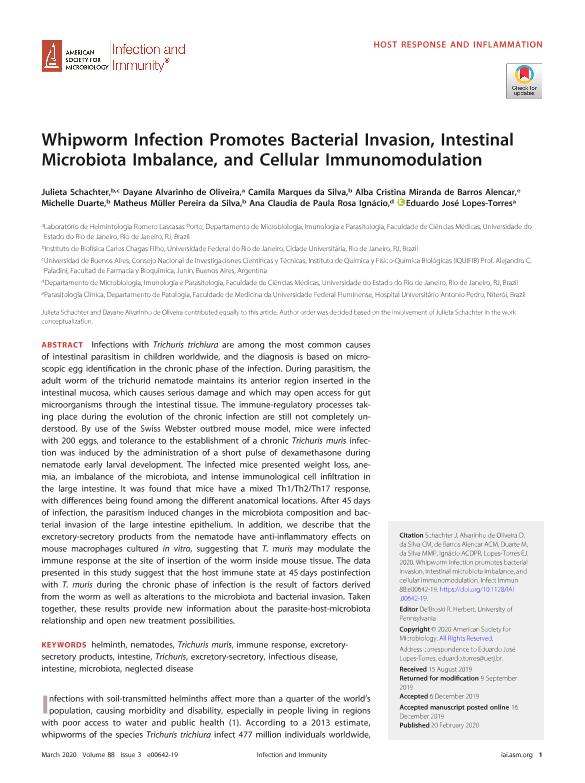Artículo
Whipworm infection promotes bacterial invasion, intestinal microbiota imbalance, and cellular immunomodulation
Schachter, Julieta ; De Oliveira, Dayane Alvarinho; Da Silva, Camila Marques; De Barros Alencar, Alba Cristina Miranda; Duarte, Michelle; Müller Pereira da Silva, Matheus; De Paula Rosa Ignácio, Ana Claudia; Lopes Torres, Eduardo José
; De Oliveira, Dayane Alvarinho; Da Silva, Camila Marques; De Barros Alencar, Alba Cristina Miranda; Duarte, Michelle; Müller Pereira da Silva, Matheus; De Paula Rosa Ignácio, Ana Claudia; Lopes Torres, Eduardo José
 ; De Oliveira, Dayane Alvarinho; Da Silva, Camila Marques; De Barros Alencar, Alba Cristina Miranda; Duarte, Michelle; Müller Pereira da Silva, Matheus; De Paula Rosa Ignácio, Ana Claudia; Lopes Torres, Eduardo José
; De Oliveira, Dayane Alvarinho; Da Silva, Camila Marques; De Barros Alencar, Alba Cristina Miranda; Duarte, Michelle; Müller Pereira da Silva, Matheus; De Paula Rosa Ignácio, Ana Claudia; Lopes Torres, Eduardo José
Fecha de publicación:
03/2020
Editorial:
American Society for Microbiology
Revista:
Infection and Immunity
ISSN:
0019-9567
Idioma:
Inglés
Tipo de recurso:
Artículo publicado
Clasificación temática:
Resumen
Infections with Trichuris trichiura are among the most common causes of intestinal parasitism in children worldwide, and the diagnosis is based on microscopic egg identification in the chronic phase of the infection. During parasitism, the adult worm of the trichurid nematode maintains its anterior region inserted in the intestinal mucosa, which causes serious damage and which may open access for gut microorganisms through the intestinal tissue. The immune-regulatory processes taking place during the evolution of the chronic infection are still not completely understood. By use of the Swiss Webster outbred mouse model, mice were infected with 200 eggs, and tolerance to the establishment of a chronic Trichuris muris infection was induced by the administration of a short pulse of dexamethasone during nematode early larval development. The infected mice presented weight loss, anemia, an imbalance of the microbiota, and intense immunological cell infiltration in the large intestine. It was found that mice have a mixed Th1/Th2/Th17 response, with differences being found among the different anatomical locations. After 45 days of infection, the parasitism induced changes in the microbiota composition and bacterial invasion of the large intestine epithelium. In addition, we describe that the excretory-secretory products from the nematode have anti-inflammatory effects on mouse macrophages cultured in vitro, suggesting that T. muris may modulate the immune response at the site of insertion of the worm inside mouse tissue. The data presented in this study suggest that the host immune state at 45 days postinfection with T. muris during the chronic phase of infection is the result of factors derived from the worm as well as alterations to the microbiota and bacterial invasion. Taken together, these results provide new information about the parasite-host-microbiota relationship and open new treatment possibilities.
Archivos asociados
Licencia
Identificadores
Colecciones
Articulos(IQUIFIB)
Articulos de INST.DE QUIMICA Y FISICO-QUIMICA BIOLOGICAS "PROF. ALEJANDRO C. PALADINI"
Articulos de INST.DE QUIMICA Y FISICO-QUIMICA BIOLOGICAS "PROF. ALEJANDRO C. PALADINI"
Citación
Schachter, Julieta; De Oliveira, Dayane Alvarinho; Da Silva, Camila Marques; De Barros Alencar, Alba Cristina Miranda; Duarte, Michelle; et al.; Whipworm infection promotes bacterial invasion, intestinal microbiota imbalance, and cellular immunomodulation; American Society for Microbiology; Infection and Immunity; 88; 3; 3-2020; 1-24
Compartir
Altmétricas



